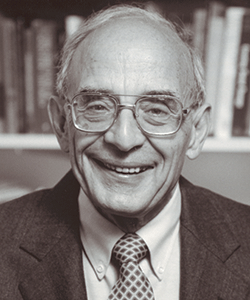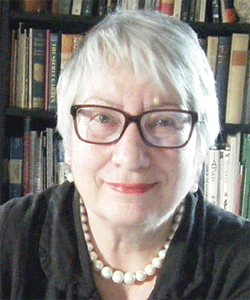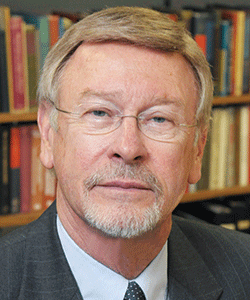Member Article
Reflecting on a Lifetime of Achievement
As part of APS’s 25th Anniversary celebration, the Board of Directors is honoring 25 distinguished scientists who have had a profound impact on the field of psychological science over the past quarter-century. Eight individuals have been selected to receive the James McKeen Cattell Fellow Award, honoring a lifetime of significant contributions to applied psychological research; seventeen scientists are receiving the William James Fellow Award, which recognizes their significant intellectual contributions to the basic science of psychology. In this issue of the Observer, APS continues the series by profiling four of these eminent scientists: Chris Argyris, Uta Frith, Ed Diener, and Allan R. Wagner.

Chris Argyris
Harvard University
James McKeen Cattell Fellow Award
Chris Argyris is one of the world’s most respected management thinkers. A behavioral scientist, he has devoted his career to understanding how organizations operate and how managers learn.
Argyris’s early research focused on the impact of formal organizational structures, control systems, and management on individuals — and how those individuals respond and adapt to them. He was an early adopter of the ground-breaking T-group experiments in the 1960s. T-group training involves increasing trainees’ skills in working with other people, and Argyris found that T-groups successfully melted the rigid, authoritarian behavior of many managers. But to his chagrin, most T-group trainees reverted to their former behaviors once back in the workplace.
He has also focused his research on organizational change, in particular the behavior of senior executives, and on individual and organization learning.
Argyris is best known for his theory, in collaboration with the late philosophy scholar Donald Schön, on the two types of learning — single-loop and double-loop. This theory refers to the way people respond to changes in their environment. Single-loop learning is the repeated attempt at the same problem by an organization or individual, without varying the method or questioning the goal. Double-loop learning goes beyond that, modifying the goal in light of the experience.
Argyris’s work raises profound questions about how organizations run, and casts doubt on what is widely accepted as good practice. But he offers management a profound exploration of the fundamental principles of organizational behavior and human interaction in the workplace.

Uta Frith
University College London and University of Aarhus
William James Fellow Award
An internationally renowned developmental psychologist, Uta Frith has pioneered much of the current research into the cognitive neuroscience of autism and dyslexia. In fact, she is regarded as one of the first scientists to recognize autism as a condition of the brain rather than the outcome of detached parenting, a conclusion she argued for persuasively in her seminal 1989 book Autism: Explaining the Enigma.
In her work with APS Fellows Alan Leslie (now a professor at Rutgers University) and Simon Baron-Cohen (now a professor at the University of Cambridge), Frith pioneered the idea that autistic people lack a theory of mind — the ability to attribute mental states to oneself and others and to intuit what others may be thinking. She has also proposed the theory that individuals with autism have “weak central coherence,” leaving them highly capable of processing details but worse than other individuals at integrating information from many sources.
Additionally, Frith has been a major force in destigmatizing dyslexia, showing it to be separate from environment and intelligence. Her work on reading development and spelling has been highly influential. Most recently, Frith has been championing the advancement of women in science, fostering support networks for female researchers who juggle family and career. She has worked tirelessly to close the divide between neuroscientists, teachers, and policymakers, calling for a common language to bridge lab-based experiments and classroom practice. Ultimately, her goal is to help improve the quality of life of those with developmental disorders by a better understanding of the challenges they face.
Read Uta Frith’s reflection on “Autism and Dyslexia: A Glance Over 25 Years of Research” in the November 2013 issue of Perspectives on Psychological Science.

Ed Diener
University of Illinois at Urbana Champaign
William James Fellow Award
Nicknamed “Dr. Happiness,” Ed Diener is one of the leading pioneers in scientific research on happiness. He developed the Satisfaction with Life Scale and many other research protocols currently used by psychologists; he is chiefly responsible for coining and conceptualizing the term “Subjective Well-Being (SWB)” — how people experience the quality of their lives.
According to Diener’s research, there is a positive level of SWB throughout the world, with the possible exception of extremely poor countries. He’s found that even the majority of disadvantaged people, including those with disabilities, report higher-than-neutral levels of happiness. He hypothesizes that human beings possess a genetic basis for “positive affect” that we generally return to, even after horrible events.
One of Diener’s most noteworthy studies, conducted at the University of Illinois with APS Williams James Fellow and James McKeen Cattell Fellow Martin Seligman, found that students with the highest levels of happiness and fewest signs of depression had strong ties to friends and family and a commitment to spending time with them. In recent years, Diener’s research has compared happiness in different parts of the world. He has studied 160 nations of the world and discovered universal predictors of subjective well-being (such as meeting basic needs and having others one can count on), and also culture-specific predictors. In the last decade, Diener has advocated national accounts of subjective well-being, and this is becoming a reality in the United Kingdom and many other nations.
Diener has studied the effects that temperament and personality have on well-being, and is examining the effects of SWB on health and functioning. He’s also studied the links between personal income and happiness, and has found that once basic needs are met, additional income does little to raise one’s sense of life satisfaction. His empirical examination of happiness has contributed enormously to the understanding of human existence.
Read Ed Diener’s reflection on “The Remarkable Changes in the Science of Subjective Well-Being” in the November 2013 issue of Perspectives on Psychological Science.

Allan R. Wagner
Yale University
William James Fellow Award
Allan Wagner has been a major innovator of powerful concepts that have revolutionized theories of habituation, classical conditioning, and instrumental conditioning. His proposals, in collaboration with University of Pennsylvania psychology professor and APS William James Fellow Robert Rescorla, of the fundamental laws of conditioning provided significant hypotheses that have dominated and reshaped the understanding of associative processes.
The Rescorla-Wagner Model of Pavlovian conditioning assumes that learning is determined by the discrepancy between what is expected to happen and what actually happens. Subsequent models from Wagner’s laboratory have broadened the framework for this conception. The “Sometime Opponent Process” (SOP) model provides a more general account of how the processing of any stimulus depends on the discrepancy between what is in active memory and what happens. The “Affective Extension of SOP” (AESOP) addresses the differences, and the interaction, between affective and sensory/perceptual stimulus processing. The recent “Replaced Elements Model” (REM) presents a conception of how stimuli are differentially represented in different context, to allow for a variety of phenomena that have been problematic for elemental associative theories, including the Rescorla-Wagner Model.
Much of Wagner’s theory testing research has involved study of the conditioned eyeblink response of the rabbit — a very fruitful preparation that he helped to introduce to behavioral and neurobiological investigation. It is satisfying that the SOP and AESOP models appear to map gracefully onto what is known about the neural circuitry underlying the conditioned eyeblink.
Wagner’s current research is largely devoted to human contingency learning, particularly as involved in the formation of causal judgments, to which the Rescorla-Wagner Model and SOP have frequently been applied.
He has set a stellar example for behavior researchers and theorists.





APS regularly opens certain online articles for discussion on our website. Effective February 2021, you must be a logged-in APS member to post comments. By posting a comment, you agree to our Community Guidelines and the display of your profile information, including your name and affiliation. Any opinions, findings, conclusions, or recommendations present in article comments are those of the writers and do not necessarily reflect the views of APS or the article’s author. For more information, please see our Community Guidelines.
Please login with your APS account to comment.